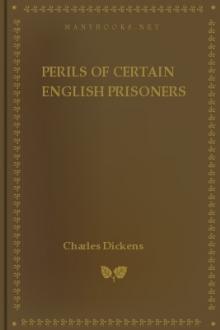With Wolfe in Canada: The Winning of a Continent, G. A. Henty [ebooks online reader txt] 📗

- Author: G. A. Henty
Book online «With Wolfe in Canada: The Winning of a Continent, G. A. Henty [ebooks online reader txt] 📗». Author G. A. Henty
Colonel Otway received James with great cordiality.
"We are very glad to get you with us, Mr. Walsham," he said, "and we consider it a credit to the regiment to have a young officer who has been, three times, mentioned in despatches. You will, too, be a great service to us, and will be able to give us a good many hints as to this Indian method of fighting, which Braddock's men found so terrible."
"It is not formidable, sir, when you are accustomed to it; but, unfortunately, General Braddock forced his men to fight in regular fashion, that is, to stand up and be shot at, and that mode of fighting, in the woods, is fatal. A hundred redskins would be more than a match, in the forest, for ten times their number of white troops, who persisted in fighting in such a ridiculous way; but, fighting in their own way, white men are a match for the redskins. Indeed, the frontiersmen can thrash the Indians, even if they are two or three to one against them."
"You have been in this last affair on the lake, have you not, Mr. Walsham? I heard you were with Johnson."
"Yes, sir, I was, and at the beginning it was very nearly a repetition of Braddock's disaster; but, after being surprised and, at first, beaten, the column that went out made such a stout fight of it, that it gave us time to put the camp in a state of defence. Had the Indians made a rush, I think they would have carried it; but, as they contented themselves with keeping up a distant fire, the provincials, who were all young troops, quite unaccustomed to fighting, and wholly without drill or discipline, gradually got steady, and at length sallied out and beat them decisively."
"I will not detain you, now," the colonel said; "but I hope, ere long, you will give us a full and detailed account of the fighting you have been in, with your idea of the best way of training regular troops for the sort of work we have before us. Mr. Edwards will take you over to the mess, and introduce you to your brother officers."
James was well received by the officers of his regiment, and soon found himself perfectly at home with them. He had to devote some hours, every day, to acquiring the mysteries of drill. It was, to him, somewhat funny to see the pains expended in assuring that each movement should be performed with mechanical accuracy; but he understood that, although useless for such warfare as that which they had before them, great accuracy in details was necessary, for ensuring uniformity of movement among large masses of men in an open country.
Otherwise, the time passed very pleasantly. James soon became a favourite in the regiment, and the young officers were never tired of questioning him concerning the redskins, and their manner of fighting. There were plenty of amusements. The snow was deep on the ground, now, and the officers skated, practised with snowshoes, and drove in sleighs. Occasionally they got up a dance, and the people of Albany, and the settlers round, vied with each other in their hospitality to the officers.
One day, in February, an orderly brought a message to James Walsham, that the colonel wished to speak to him.
"Walsham," he said, "I may tell you, privately, that the regiment is likely to form part of the expedition which is being fitted out, in England, against Louisbourg in Cape Breton, the key of Canada. A considerable number of the troops from the province will accompany it."
"But that will leave the frontier here altogether open to the enemy," James said in surprise.
"That is my own opinion, Walsham. Louisbourg is altogether outside the range of the present struggle, and it seems to me that the British force should be employed at striking at a vital point. However, that is not to the purpose. It is the Earl of Loudon's plan. However, it is manifest, as you say, that the frontier will be left terribly open, and therefore two companies of each of the regiments going will be left. Naturally, as you are the only officer in the regiment who has had any experience in this forest warfare, you would be one of those left here; but as an ensign you would not have much influence, and I think that it would be at once more useful to the service, and more pleasant for yourself, if I can obtain for you something like a roving commission. What do you think of that?"
"I should greatly prefer that, sir," James said gratefully.
"The general is a little vexed, I know," the colonel went on, "at the numerous successes, and daring feats, gained by Rogers and the other leaders of the companies of scouts, while the regulars have not had an opportunity to fire a shot: and I think that he would, at once, accept the proposal were I to make it to him, that a company, to be called the Royal Scouts, should be formed of volunteers taken from the various regiments, and that you should have the command."
"Thank you, sir," James said, "and I should like it above all things; but I fear that we should have no chance, whatever, of rivalling the work of Rogers and the other partisan leaders. These men are all trained to the work of the woods, accustomed to fight Indians, equally at home in a canoe or in the forest. I have had, as you are good enough to say, some experience in the work, but I am a mere child by their side, and were I to lead fifty English soldiers in the forest, I fear that none of us would ever return."
"Yes, but I should not propose that you should engage in enterprises of that sort, Walsham. My idea is that, although you would have an independent command, with very considerable freedom of action, you would act in connection with the regular troops. The scouts are often far away when wanted, leaving the posts open to surprise. They are so impatient of any discipline, that they are adverse to going near the forts, except to obtain fresh supplies. You, on the contrary, would act as the eyes of any post which you might think threatened by the enemy. At present, for instance, Fort William Henry is the most exposed to attack.
"You would take your command there, and would report yourself to Major Eyre, who is in command. As for service there, your letter of appointment would state that you are authorized to act independently, but that, while it would be your duty to obey the orders of the commanding officer, you will be authorized to offer such suggestions to him as your experience in Indian warfare would lead you to make. You would train your men as scouts. It would be their special duty to guard the fort against surprise, and, of course, in case of attack to take part in its defence. In the event of the provincial scouts making any concerted movement against a French post, you would be authorized to join them. You would then have the benefit of their skill and experience, and, in case of success, the army would get a share of the credit. What do you think of my plan?"
"I should like it above all things," James replied. "That would be precisely the duty which I should select had I the choice."
"I thought so," the colonel said. "I have formed a very high opinion of your judgment and discretion, from the talks which we have had together, and I have spoken strongly in your favour to the general, who had promised me that, in the event of the army moving forward, you should have an appointment on the quartermaster general's staff, as an intelligence officer.
"Since I heard that the main portion of the army is to sail to Louisbourg, I have been thinking this plan over, and it certainly seems to me that a corps, such as that that I have suggested, would be of great service. I should think that its strength should be fifty men. You will, of course, have another officer with you. Is there anyone you would like to choose, as I may as well take the whole scheme, cut and dried, to the general?"
"I should like Mr. Edwards, sir. He is junior to me in the regiment, and is very active and zealous in the service; and I should greatly like to be allowed to enlist, temporarily, two of the scouts I have served with in the force, with power for them to take their discharge when they wished. They would be of immense utility to me in instructing the men in their new duties, and would add greatly to our efficiency."
"So be it," the colonel said. "I will draw out the scheme on paper, and lay it before the general today."
In the afternoon, James was again sent for.
"The earl has approved of my scheme. You will have temporary rank as captain given you, in order to place your corps on an equal footing with the provincial corps of scouts. Mr. Edwards will also have temporary rank, as lieutenant. The men of the six companies, of the three regiments, will be paraded tomorrow, and asked for volunteers for the special service. If there are more than fifty offer, you can select your own men."
Accordingly, the next morning, the troops to be left behind were paraded, and an order was read out, saying that a corps of scouts for special service was to be raised, and that volunteers were requested. Upwards of a hundred men stepped forward, and, being formed in line, James selected from them fifty who appeared to him the most hardy, active, and intelligent looking. He himself had, that morning, been put in orders as captain of the new corps, and had assumed the insignia of his temporary rank. The colonel had placed at his disposal two intelligent young non-commissioned officers.
The next morning, he marched with his command for Fort William Henry. No sooner had he left the open country, and entered the woods, than he began to instruct the men in their new duties. The whole of them were thrown out as skirmishers, and taught to advance in Indian fashion, each man sheltering himself behind a tree, scanning the woods carefully ahead, and then, fixing his eyes on another tree ahead, to advance to it at a sharp run, and shelter there.
All this was new to the soldiers, hitherto drilled only in solid formation, or in skirmishing in the open, and when, at the end of ten miles skirmishing through the wood, they were halted and ordered to bivouac for the night, James felt that his men were beginning to have some idea of forest fighting. The men themselves were greatly pleased with their day's work. It was a welcome change after the long monotony of life in a standing camp, and the day's work had given them a high opinion of the fitness of their young officer for command.
But the work and instruction was not over for the day. Hitherto, none of the men had had any experience in camping in the open. James now showed them how to make comfortable shelters against the cold, with two forked sticks and one laid across them, and with a few boughs and a blanket laid over them, with dead leaves heaped round the bottom and ends; and how best to arrange their fires and cook their food.
During the following days, the same work was repeated, and when, after a week's marching, the force issued from the forest into the clearing around Fort William Henry, James felt confident that his men would be able to hold their own in a brush with the Indians. Major Eyre, to whom James reported himself, and showed his appointment defining his authority and duties, expressed much satisfaction at the arrival of the reinforcement.
"There are rumours, brought here by the scouts," he said, "that a strong force will, ere long, come down from Crown Point to Ticonderoga, and that we shall be attacked. Now that the lake is frozen, regular troops could march without difficulty, and my force here is very inadequate, considering the strength with which the French will attack. None of my officers or men have any experience of the Indian methods of attack, and your experience will be very valuable. It is a pity that they do not give me one of these companies of scouts permanently. Sometimes one or other of them is here, but often I am without any of the provincials, and, although I have every confidence in my officers and men, one cannot but feel that it is a great disadvantage to be exposed to the attack of an enemy of whose tactics one is altogether ignorant.
"You will, of course, encamp your men inside the fort.





Comments (0)